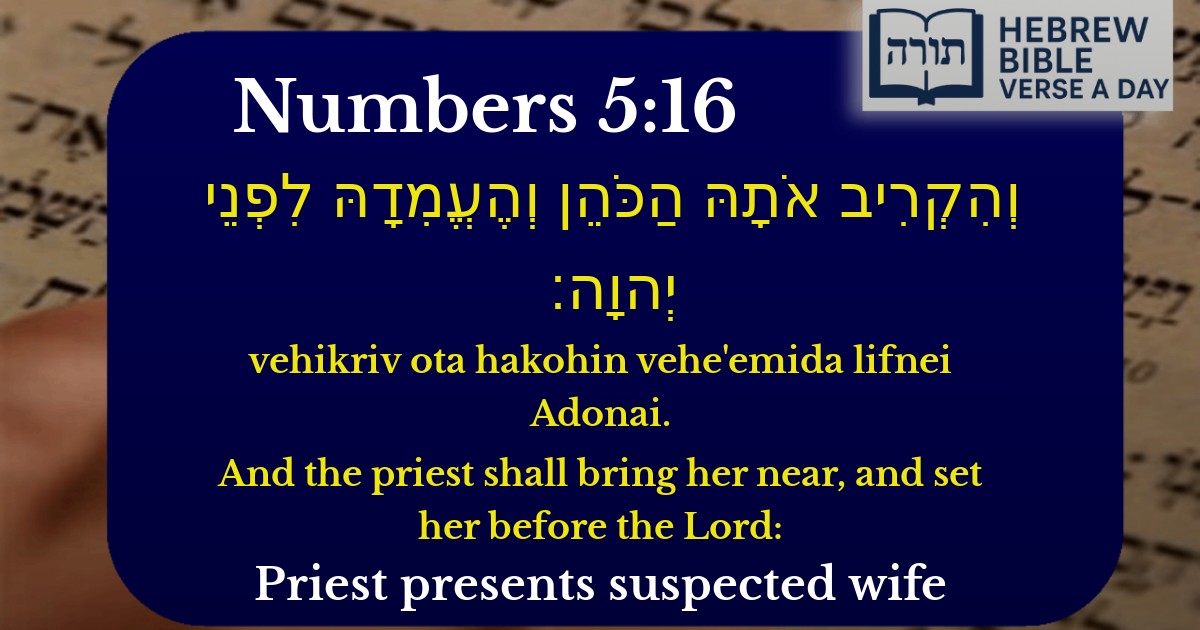Join Our Newsletter To Be Informed When New Videos Are Posted
Join the thousands of fellow Studends who rely on our videos to learn how to read the bible in Hebrew for free!
Hebrew Text
וְהִקְרִיב אֹתָהּ הַכֹּהֵן וְהֶעֱמִדָהּ לִפְנֵי יְהוָה׃
English Translation
And the priest shall bring her near, and set her before the Lord:
Transliteration
Vehikriv ota hakohin vehe'emida lifnei Adonai.
Hebrew Leining Text
וְהִקְרִ֥יב אֹתָ֖הּ הַכֹּהֵ֑ן וְהֶֽעֱמִדָ֖הּ לִפְנֵ֥י יְהֹוָֽה׃
וְהִקְרִ֥יב אֹתָ֖הּ הַכֹּהֵ֑ן וְהֶֽעֱמִדָ֖הּ לִפְנֵ֥י יְהֹוָֽה׃
🎵 Listen to leining
Parasha Commentary
📚 Talmud Citations
This verse is not quoted in the Talmud.


Context of the Verse
This verse (Numbers 5:16) appears in the context of the sotah ritual, the procedure for a woman suspected of adultery (sotah). The Torah outlines a detailed process involving the bringing of an offering and the administration of a solemn oath by the priest. The phrase "וְהִקְרִיב אֹתָהּ הַכֹּהֵן וְהֶעֱמִדָהּ לִפְנֵי יְהוָה" ("And the priest shall bring her near, and set her before the Lord") marks a critical moment in this ritual, where the woman is formally presented before Hashem in the Mishkan or Beit HaMikdash.
Explanation of the Ritual
Rashi (on Numbers 5:16) explains that the priest brings the woman near to the entrance of the Mishkan (or later, the Beit HaMikdash) to emphasize the gravity of the situation. Standing "before the Lord" signifies that this is a divine judgment, not merely a human legal proceeding. The Rambam (Hilchot Sotah 3:1) elaborates that this act is meant to instill awe and encourage confession if she is indeed guilty.
Symbolism of "Bringing Near"
The Role of the Priest
The priest's involvement is central, as he serves as an intermediary between the human and divine realms. The Midrash (Bamidbar Rabbah 9:9) highlights that the priest must act with compassion, ensuring the procedure is carried out with dignity and without undue humiliation, as the Torah seeks truth and justice, not vengeance.
Broader Ethical Lessons
Beyond the specific sotah law, this verse teaches about the seriousness of oaths and the consequences of sin. The Talmud (Sotah 2a) connects this to broader themes of trust and integrity in relationships, emphasizing that wrongdoing ultimately stands "before the Lord," who knows all hidden deeds.